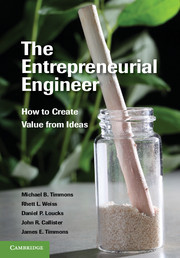Description
The Entrepreneurial Engineer
How to Create Value from Ideas
Authors: Timmons Michael B., Weiss Rhett L., Loucks Daniel P., Callister John R., Timmons James E.
Written by teachers and successful entrepreneurs, this textbook includes guidance, instruction and practical lessons for the prospective entrepreneur.
Language: English
71.34 €
In Print (Delivery period: 14 days).
Add to cart
The Entrepreneurial Engineer
Publication date: 10-2013
487 p. · 17.8x25.5 cm · Paperback
Publication date: 10-2013
487 p. · 17.8x25.5 cm · Paperback
Approximative price 143.25 €
In Print (Delivery period: 14 days).
Add to cart
The Entrepreneurial Engineer
Publication date: 10-2013
492 p. · 17.8x25.7 cm · Hardback
Publication date: 10-2013
492 p. · 17.8x25.7 cm · Hardback
Description
/li>Contents
/li>Biography
/li>
Authors, educators and successful entrepreneurs wrote this textbook with the primary goal of maximising your chance of entrepreneurial success. It is designed to encourage those wanting to start a business and those who have already begun. It includes guidance, instruction and practical lessons for the prospective entrepreneur. The book focuses on early stage financing of a start-up company, beginning with an emphasis on constructing an effective business plan, including writing techniques to help convey your message, and preparing solid financial statements. This 'why' and 'how' of writing a business plan is followed by recommendations on raising outside capital. Important topics include developing your marketing strategy, recruiting and managing creatives and managers, and retaining effective employees. Legal structures, negotiation strategies, and economic evaluation of opportunities are also discussed. The book concludes with a chapter on project management. It includes many engineering economy topics, sufficient for those taking the FE exam.
1. Entrepreneur's primer; 2. Recognizing opportunity; 3. Defining your opportunity; 4. Developing your business concept; 5. Creating your team; 6. Creating your company; 7. Financial accounting; 8. Business plans, presentations, and letters; 9. Fund raising; 10. Rules of investing; 11. Negotiation; 12. Management; 13. Project scheduling: critical path methods, program evaluation, and review techniques.
Dr Michael B. Timmons is a professor in the Department of Biological and Environmental Engineering at Cornell University. Dr Timmons is a successful entrepreneur and has led successful fund raising efforts from both angel investors and venture capitalists. In 1997, Dr Timmons' first major entrepreneurial venture was launching an indoor fish farm, in upstate NY, called Fingerlakes Aquaculture, LLC. His teaching and the lessons learned from this experience prompted Timmons to begin writing this textbook. Dr Timmons is one of the recognized authorities on recirculating aquaculture technologies and co-author of the text Recirculating Aquaculture (Timmons/Ebeling). He was one of the founders of the Aquacultural Engineering Society and has served in several officer positions including President. In the Spring of 2012 Timmons launched Kentucky Natural Organics, LLC, a 500,000 lb/yr tilapia farm and a facility for the hydroponic production of leafy greens and tomatoes.
Dr Rhett L. Weiss is the Executive Director of the Entrepreneurship and Innovation Institute at Cornell's Johnson Graduate School of Management, where he teaches graduate students in the entrepreneurship and venture capital areas. Before joining Cornell, he had more than 25 years of experience in leadership and management roles. Dr Weiss has served as a bank COO, directed a consulting practice at a Big 4 accountancy firm, practised law at a major international law firm, and attained a software and business method patent. Throughout his career, he has been involved in more than $30 billion-worth of transactions and in dozens of entrepreneurial ventures and innovation initiatives. Among them, he is Chairman and CEO of DEALTEK, which he founded in 1999. From 2005 to 2010, he served as Senior Team Leader - Strategic Development for Google. He was chief designer and negotiator of several large strategic acquisition and development projects for Google's global infrastructure. He headed key initiatives, contract
Dr Rhett L. Weiss is the Executive Director of the Entrepreneurship and Innovation Institute at Cornell's Johnson Graduate School of Management, where he teaches graduate students in the entrepreneurship and venture capital areas. Before joining Cornell, he had more than 25 years of experience in leadership and management roles. Dr Weiss has served as a bank COO, directed a consulting practice at a Big 4 accountancy firm, practised law at a major international law firm, and attained a software and business method patent. Throughout his career, he has been involved in more than $30 billion-worth of transactions and in dozens of entrepreneurial ventures and innovation initiatives. Among them, he is Chairman and CEO of DEALTEK, which he founded in 1999. From 2005 to 2010, he served as Senior Team Leader - Strategic Development for Google. He was chief designer and negotiator of several large strategic acquisition and development projects for Google's global infrastructure. He headed key initiatives, contract
© 2024 LAVOISIER S.A.S.




